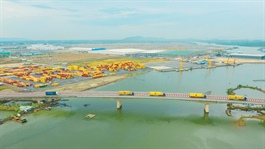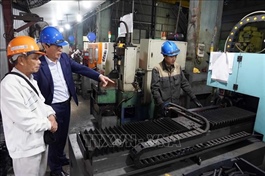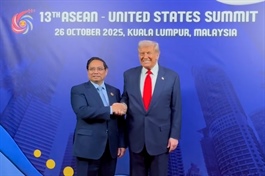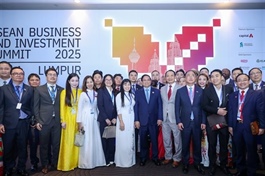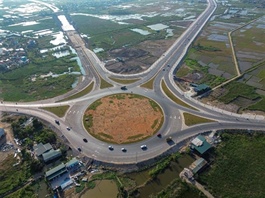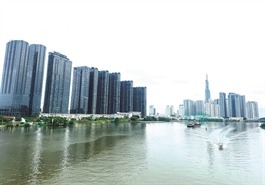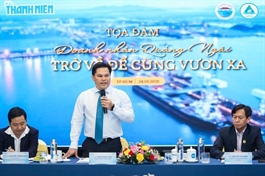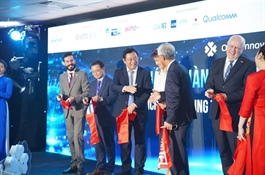Mandates reshaping US and European FDI
Mandates reshaping US and European FDI
The restructuring of US and European foreign funding strategies towards Vietnam is now centrally guided by the principles of de-risking and resilience. Dr. Sven David, general director and CEO at VIET Transformation Advisors, analyses mandates reshaping such investment in Vietnam.
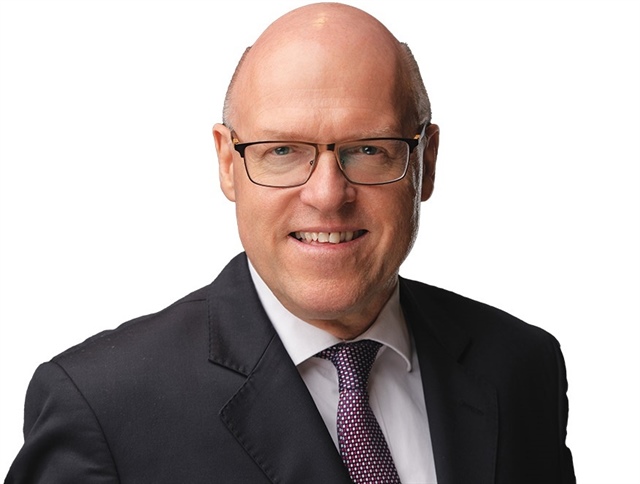
Dr. Sven David, general director and CEO at VIET Transformation Advisors |
Against the backdrop of persistent global trade tensions and ongoing tariff normalisation, reflecting significant strategic realignments and new trade agreements, in 2025, investors decisively shift focus from simple cost advantages towards managing systemic risks and building supply chains capable of absorbing unpredictable disruptions.
While this shift does not constitute an existential necessity for every company, it represents a fundamental strategic imperative to preserve future market access and ensure sustainable profitability.
Vietnam currently faces a pivotal moment. Its potential to become Southeast Asia’s premier hub for advanced manufacturing and high-tech industries fundamentally depends on how effectively it anticipates and meets the evolving demands of sophisticated multinational investors.
Achieving this transformation requires coordinated efforts in governance reform, workforce development, infrastructure modernisation, and administrative efficiency. Competitive fiscal incentives alone are insufficient. Vietnam must commit operationally to facilitating this complex corporate transition and position itself as a proactive implementation partner.
Early 2025 data indicate foreign direct investment (FDI) pledges remain strong, signalling investor confidence but underscoring the urgency of systemic reforms to absorb this capital effectively.
Investors’ mandates consolidate into four non-negotiable priorities: strategic diversification, systemic resilience, deep localisation, and advanced operational readiness. These pillars profoundly influence major capital allocation decisions and define Vietnam’s competitive positioning as an investment destination.
Strategic diversification embodies a global imperative to reduce exposure to concentrated geopolitical risks by reallocating capital towards stable and transparent jurisdictions.
Vietnam’s political stability, strategic location, and comprehensive free trade agreements naturally position it as an anchor for this shift. However, fierce competition exists from regional neighbours such as Thailand and Indonesia. Sustained investor confidence depends not only on favourable macroeconomic conditions but also on predictable, enforceable regulatory frameworks buttressed by governance structures emphasising clear roles, independent oversight, and professional standards.
Absent these, perceived uncertainty elevates risk premiums and limits capital inflows. Transparency and robust institutions thus lay the foundation for this diversification strategy. This commitment to institutional clarity was validated in October by FTSE Russell provisionally upgrading Vietnam to a secondary emerging market, reflecting successful financial market enhancements and removal of barriers like pre-funding requirements.
Systemic resilience transcends location and finance: it requires operational ecosystems resilient to geopolitical and logistical shocks.
High-tech FDI especially follows talent. Vietnam’s severe shortage of mid-level technical and managerial professionals remains a critical constraint. Remedying this demands a well-funded national overhaul of vocational and higher education systems, pivoting from outdated theoretical instruction towards work-integrated learning and dual vocational training crafted collaboratively with industry.
This ensures graduates possess precise, up-to-date skills aligned with sophisticated manufacturing and research needs, improving both investment returns and operational continuity.
Structural incentives must drive private sector involvement in curriculum development and workplace training to close skills gaps and expedite Vietnam’s knowledge-based economy transition. The quality and availability of this workforce will decisively shape Vietnam’s long-term position in global value chains.
Renewables and localisation
Additionally, Vietnam’s ability to source renewable energy rapidly becomes key to systemic resilience. High-value US and European manufacturers committed to stringent net-zero targets require reliable access to renewables certificates and direct power purchase agreements. Vietnam must urgently align energy policies and grid infrastructure to operationalise its clean energy ambitions for investors.
Localisation of value creation goes beyond simple assembly to integrated, high-value manufacturing. Multinationals’ sustained profitability depends on reliable, high-quality local suppliers compliant with international standards in quality, volume, and intellectual property protection, especially within tier 2 and tier 3 segments where substantial value is realised. Vietnam’s industrial fabric still faces structural barriers to meeting these demands.
Bridging the technological and quality gap between foreign capital and domestic small- and medium-sized enterprises represents the greatest leverage point to secure superior FDI quality and enduring economic benefits. This calls for vigorous government-backed programmes promoting international certifications, facilitating technology transfer, and providing stringent quality mentorship.
The goal is to ensure local firms are plug-and-play ready, transcending subcontracting to become genuine technology partners bolstering the domestic ecosystem.
Advanced operational readiness closely links to administrative transparency and efficiency. Investors heavily weigh the clarity and speed of licensing and regulatory approvals when assessing perceived risk
Ambitious administrative restructuring, including local unit mergers and a two-tier governance model, aims to centralise power and streamline decision-making.
Centralising priority FDI project management under a single empowered authority with clear jurisdiction and mandatory timelines could expedite approvals and build investor trust. Digitising regulatory workflows further enhances transparency and accelerates processes. Clearly published and consistent procedures underpin institutional trust, crucial for multi-billion-dollar investments. Bureaucratic delays directly impact decisions, so boosting administrative agility is essential for competitiveness.
Systemic resilience and operational readiness rely on transforming physical infrastructure. Capital-intensive high-tech sectors like semiconductors and electric vehicle components prioritise operational reliability above cost, as downtime jeopardises profits and supply chain fidelity. Traditional industrial parks cannot meet these sectors’ demands.
Designed for resilience
It is advised that Vietnam transforms ageing parks into specialised industrial clusters tailored for strategic high-tech industries, with fully integrated, globally standard-compliant infrastructure.
This includes pre-certified uninterrupted power critical for electronics, redundant high-throughput digital networks, advanced wastewater treatment meeting purity standards, and unfaltering utilities: fundamental preconditions for top-tier investment.
The main challenge for investors is managing the transition from strategic decision to operational reality. European and US multinationals undertake major operational relocations, redefining global supply chains. This complex, large-scale transformation is the greatest strategic risk. Executing corporate transformation and restructuring is the decisive hurdle for enduring success. New infrastructure like specialised clusters and fiscal incentives are necessary but insufficient; execution capability is crucial.
Vietnam’s sustained success hinges on actively supporting and expediting this transition, turning inevitable integration costs into competitive edges. Forward-looking industrial property strategies supporting smart, eco-friendly zones will be central in upcoming policy agendas.
Beyond operational readiness, the global shift to sustainable finance means capital flows increasingly screen through environmental, social, and governance (ESG) criteria. Vietnam’s access to premier institutional capital, from pension and sovereign wealth funds, depends on demonstrable green transition commitment, labour standards adherence, and corporate governance. Certified green industrial zones and transparent reporting are mandatory for tapping top international capital and mitigating reputational risks.
Meeting ESG standards demands deep operational expertise and compliance, reinforcing the need for holistic transformation support. The recent emerging market provisional upgrade is projected to unleash significant passive and active inflows, estimated at $10.4 billion within 12–18 months, making adherence to high-tier ESG mandates an immediate priority.
Addressing these complex challenges requires specialised expertise in operational excellence, regulatory compliance, and strategic change leadership. Bridging global headquarters and Vietnamese subsidiaries’ cultural and operational divides is vital. Success depends on consistent quality, restructuring management, and leading rapid human and tech transitions for scalable growth.
Aligning industrial real estate and public-private initiatives to US and European investor operational needs will firmly establish Vietnam as an innovative, high-value de-risking hub. This reputation maximises economic dividends and unlocks the next growth phase.
Success requires expertise in three areas providing necessary assurance: ensuring consistent quality and maximised throughput across new lines; navigating complex legal and regulatory landscapes for seamless setups; and overseeing human and technological transitions for swift scalability.
Vietnam has a generational opportunity to reinvent its industrial scene by exceeding global high-tech investor standards. The effectiveness of pragmatic coordinated reforms in governance, workforce, infrastructure, and administration will determine its ability to convert challenges into sustainable competitive advantages.
How Vietnam seizes this moment will shape its future as a global industrial leader, enhancing resilience and growth amid intensifying global competition.
- 18:00 27/10/2025



